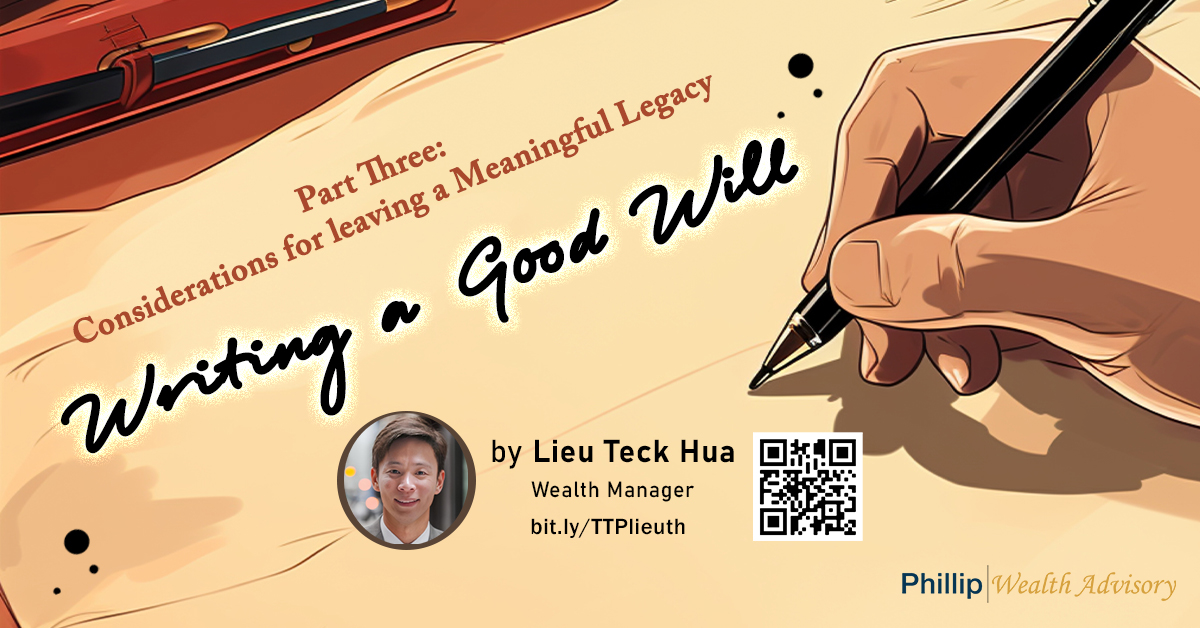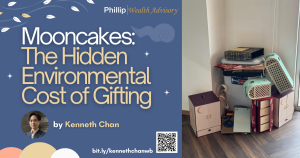Writing a Good Will: Considerations for Leaving a Meaningful Legacy (Part 3) July 15, 2024

(This article doesn’t apply to foreigners nor our Muslim friends in Singapore.)
In our previous 3-part series, we have explored why a well-crafted Will is an invaluable document that provides crucial guidance on asset distribution, the appointment of key personnel, and the avoidance of common pitfalls that may unintentionally create conflict and disrupt family harmony. When approached thoughtfully, a Will can serve as a powerful tool for ensuring your wishes are honoured and your loved ones cared for, even after you’re gone.
Most people aspire to be remembered for their positive contributions to their loved ones, their community, or even humanity as a whole. As the renowned author Stephen R. Covey once said, “the need to leave a legacy is our spiritual need to have a sense of meaning, purpose, personal congruence, and contribution.” This desire to achieve a form of “immortality” through the lasting impact of our actions is a profoundly human impulse.
However, the concept of “legacy” is highly subjective, with views and priorities varying significantly among individuals. What constitutes a meaningful legacy for one person may be quite different for another. It’s important to approach this topic with an open mind and a willingness to consider diverse perspectives.
In the following sections, we will delve deeper into the role of Wills in shaping one’s legacy, drawing upon my personal reflections as well as interactions with my clients. The content is structured into the following headers:
- Crafting a Will that Reflects Your Value
- Providing for Loved Ones
- Additional Considerations for Descendants
- Conclusion
1. Crafting a Will that Reflects Your Value
Defining your core values and priorities is a crucial first step towards creating a meaningful Will. However, this process can be deeply personal and complex, requiring thoughtful reflection and consideration.
Identify Your Guiding Principles
Begin by taking the time to thoughtfully examine the principles, causes, and relationships that have been most important to you throughout your life. What values have shaped your decisions and actions? What impact do you hope to make and how do you want to be remembered by your loved ones?
Align Your Will with Your Beliefs
Once you’ve identified your key values, you can structure your Will to reflect and uphold them. For example, if you have a strong dedication to supporting your religious community, helping the disadvantaged, or promoting environmental conservation, you may choose to allocate a portion of your estate to charitable organisations.
Alternatively, if your family is the central focus of your life, you could make provisions in your Will to support regular family gatherings, maintain the family home, or fund educational and personal growth opportunities for your descendants.
Consider a Personal Touch
In addition to the legal and financial aspects of your Will, you may also want to include more personal elements, such as letters, videos, or other forms of communication. These can be used to impart your values, offer advice, and express your hopes for your future generations.
2. Providing for Loved Ones
One of the primary purposes of a Will is to ensure the financial security and well-being of your loved ones. As an estate planner, I encourage my clients to think beyond the monetary value of their gifts and consider how their estate planning decisions can impact their beneficiaries and the family dynamics in the long run.
Equity vs Equality
When it comes to fairness and distribution, treating everyone equally is not always the best approach, nor is it advisable to simply give more to a child who is less financially secure. The key is to understand each individual, their personality, unique circumstances and needs.
Consider a scenario where one child is hardworking and frugal, while the other is lazy and financially irresponsible. If you were to give the larger share to the lazy child, you may inadvertently reinforce their undesirable behaviour and delay their learning of important life lessons. In this case, the wealth may be better utilised by the frugal child, who has demonstrated more prudent money management.
Another important factor is the contributions of each beneficiary. If one child has been more filial and actively involved in managing your affairs or providing care in your later years, it may be appropriate to allocate a larger portion to them as a way of acknowledging their efforts and dedication.
Family Dynamics
Estate planning is not only about distributing assets; it is also about managing relationships and potential conflicts within families. Family dynamics are an important consideration, as unresolved conflicts can escalate into full-blown legal disputes once the estate distribution process begins.
The situation becomes particularly volatile in cases where there is unequal distribution of assets among heirs or tensions between step-families. A case in point is the story of Tan Moh Hong Reptile Skin and Crocodile Farm [1].
In a complex case of estate planning, Mr. Tan, the patriarch, had six children from his previous marriage and a Will that provided for them. After the death of his wife, Mr. Tan reconnected with his ex-lover, who had borne him a son previously, and married her. This new marriage had a significant impact on the estate distribution. To make matters worse, Mr. Tan then drafted a new Will that left his entire $30 million estate to his wife and their only son, effectively disinheriting his children from his previous marriage.
The six children challenged the validity of the marriage and the new Will. The motivation behind Mr. Tan’s decisions remained unclear, sparking widespread discussion within the estate planning community. This situation underscores the complexities and unintended consequences that can arise in estate distribution, emphasising the importance of clear communication and careful planning to avoid disputes and ensure that one’s true intentions are understood and respected.
Addressing Potential Conflicts
To mitigate potential conflicts, one should consider the following strategies:
- Encouraging open and honest communication among family members to clarify intentions and manage expectations
- Identifying and addressing potential sources of conflict early on and addressing them proactively
- Understanding the distinction between fairness and equality when dividing assets
- Seeking professional guidance and understand the tools and options available for estate planning
- Regularly reviewing and updating estate plans as family dynamics and financial circumstances evolve over time
Personally, I advocate communicating the contents of your Will with your beneficiaries, especially if the distribution is unequal. By proactively sharing this information, you can achieve two positive outcomes. First, openly discussing the details of your Will ensures your intentions are crystal clear to every beneficiary. This leaves little room for misinterpretation or surprises that could potentially lead to the Will being contested.
The second benefit is that open communication creates an opportunity for you to connect with your beneficiaries. You can explain the reasoning behind your decisions and share the things that mattered most to you. This can foster deeper understanding and appreciation. By taking the time to have these important conversations, you can help prevent future conflicts and ensure your loved ones feel respected and valued, even after you’re gone. This level of thoughtfulness in communication can significantly enhance the legacy you leave behind.
3. Additional Considerations for Descendants
The Danger of Giving Too Much
The concept of delayed gifting in estate planning refers to the practice of leaving inheritances or gifts to beneficiaries over a period of time or at a later stage, rather than distributing them immediately.
Delayed gifting can be particularly beneficial for younger beneficiaries by not overwhelming them with a large inheritance before they are financially mature enough to manage it responsibly.
Many parents have a deep-rooted desire to provide their children with the best possible start in life. However, this well-intentioned approach can sometimes backfire if the children become overly accustomed to having everything taken care of for them.
When a child’s life is made too comfortable, it can inadvertently diminish their drive and ambition, potentially crippling their ability to be self-sufficient in the long run. There is concern that children may struggle to fend for themselves if the family’s financial circumstances were to change in the future.
It’s crucial to strike a healthy balance between support and independence. By allowing children to face a reasonable level of challenge and adversity, parents can help them develop the necessary skills, resilience, and mindset to thrive, regardless of the family’s financial situation.
This approach can ensure that the children’s desire to succeed and their ability to fend for themselves are not diminished, but rather strengthened by the support they receive.
Case Study: The Widow of Killed Changi Airport Worker [2].
A case that illustrates the challenges of managing sudden wealth is that of an individual who received nearly S$1 million in insurance payouts and public donations after her husband was killed in a freak accident while working at Changi Airport. Unfortunately, without the experience or support to manage such a substantial sum, the individual faced significant financial difficulties within a short period.
Sudden wealth can sometimes attract opportunistic individuals who may try to exploit the beneficiary’s kindness or naivety, pressuring them to lend money or make unwise investments. Delayed gifting can be a safeguard against such vulnerabilities by not releasing all the funds at once.
Instead of giving a lump sum inheritance, a more prudent approach may be to provide a stream of income to the beneficiary. This can help ensure the wealth is conserved and used responsibly over the long term.
Imparting Right Values and Belief System
Ultimately, the most crucial aspect is to raise your child well. Instilling the right values and attitude in your child ensures they won’t need your money to be successful and fulfilled in life. On the other hand, no matter how much wealth you leave behind, it won’t be enough if they lack the right mindset and principles. Therefore, the greatest gift you can give your child is not material wealth, but the right upbringing, which is truly priceless.
4. Conclusion
Crafting a will that aligns with your legacy goals can be a complex and deeply personal process, often involving difficult decisions, competing priorities, and unexpected challenges. As an experienced estate planner, my aim is to understand your unique situation and assist you in navigating these complexities.
As your trusted partner, I endeavour to truly understand your values, your hopes for the future, and the lasting impact you wish to make. Together, we will navigate the complexities and limitations to create an estate plan that honours your beliefs and leaves a meaningful legacy.
Should you feel the need for a consultation, whether to draft a straightforward will or engage in more comprehensive legacy planning, do not hesitate to contact me. My goal is to provide personalised support, offer fresh perspectives, and ensure your wishes are carried out with the utmost care and consideration.
This is your legacy – a testament that will echo through your future generations. Let’s work side-by-side to shape an enduring reflection of the life you’ve lived and the values you hold dear. When you’re ready, I’m here to listen, collaborate, and help you create a lasting impact that truly resonates.
Reference:
- 1 https://guanyu9.blogspot.com/2009/10/tycoons-kids-lose-appeal-in-dispute.html
- 2 $1m gone in one year: Widow of killed Changi Airport worker is now broke | The Straits Times
Contributor:

Lieu Teck Hua
Wealth Manager
Phillip Securities Pte Ltd (A member of PhillipCapital)
https://bit.ly/TTPlieuth
Disclaimer
These commentaries are intended for general circulation. It does not have regard to the specific investment objectives, financial situation and particular needs of any person who may receive this document. Accordingly, no warranty whatsoever is given and no liability whatsoever is accepted for any loss arising whether directly or indirectly as a result of any person acting based on this information. Opinions expressed in these commentaries are subject to change without notice. Investments are subject to investment risks including the possible loss of the principal amount invested. The value of the units and the income from them may fall as well as rise. Past performance figures as well as any projection or forecast used in these commentaries are not necessarily indicative of future or likely performance. Phillip Securities Pte Ltd (PSPL), its directors, connected persons or employees may from time to time have an interest in the financial instruments mentioned in these commentaries. Investors may wish to seek advice from a financial adviser before investing. In the event that investors choose not to seek advice from a financial adviser, they should consider whether the investment is suitable for them.
The information contained in these commentaries has been obtained from public sources which PSPL has no reason to believe are unreliable and any analysis, forecasts, projections, expectations and opinions (collectively the “Research”) contained in these commentaries are based on such information and are expressions of belief only. PSPL has not verified this information and no representation or warranty, express or implied, is made that such information or Research is accurate, complete or verified or should be relied upon as such. Any such information or Research contained in these commentaries are subject to change, and PSPL shall not have any responsibility to maintain the information or Research made available or to supply any corrections, updates or releases in connection therewith. In no event will PSPL be liable for any special, indirect, incidental or consequential damages which may be incurred from the use of the information or Research made available, even if it has been advised of the possibility of such damages. The companies and their employees mentioned in these commentaries cannot be held liable for any errors, inaccuracies and/or omissions howsoever caused. Any opinion or advice herein is made on a general basis and is subject to change without notice. The information provided in these commentaries may contain optimistic statements regarding future events or future financial performance of countries, markets or companies. You must make your own financial assessment of the relevance, accuracy and adequacy of the information provided in these commentaries.
Views and any strategies described in these commentaries may not be suitable for all investors. Opinions expressed herein may differ from the opinions expressed by other units of PSPL or its connected persons and associates. Any reference to or discussion of investment products or commodities in these commentaries is purely for illustrative purposes only and must not be construed as a recommendation, an offer or solicitation for the subscription, purchase or sale of the investment products or commodities mentioned.
About the author
Lieu Teck Hua
Wealth Manager
Lieu Teck Hua, a Wealth Manager at Phillip Securities, brings extensive experience in advising on insurance and investment products. Starting as a Remiser in 2009, he swiftly transitioned into a dual-licensed role in financial advisory. With a degree in Finance and certifications as a Chartered Financial Consultant and Associate Estate Planning Professional, Teck Hua is dedicated to providing quality financial advice. He has led seminars on topics like investment portfolio construction and will-writing, empowering over 700 clients with financial literacy.

 Protecting More Than Just Walls: Fire Insurance vs Home Insurance
Protecting More Than Just Walls: Fire Insurance vs Home Insurance  Before the Year Ends: Key Financial Steps for a Confident 2026
Before the Year Ends: Key Financial Steps for a Confident 2026  The ILP Debate: Why Singaporeans Struggle With Financial Product Decisions
The ILP Debate: Why Singaporeans Struggle With Financial Product Decisions  Mooncakes: The Hidden Environmental Cost of Gifting
Mooncakes: The Hidden Environmental Cost of Gifting 






